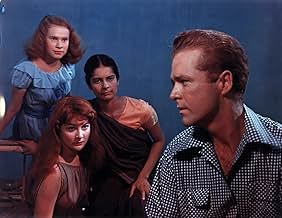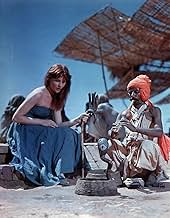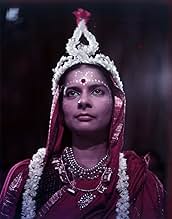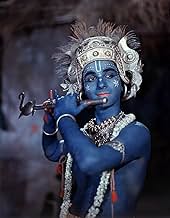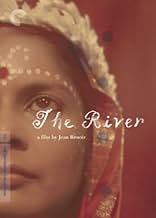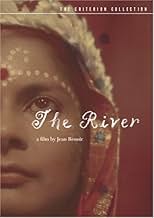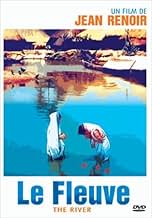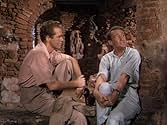IMDb RATING
7.4/10
7.3K
YOUR RATING
The growing pains of three young women contrast with the immutability of the holy Bengal River, around which their daily lives unfold.The growing pains of three young women contrast with the immutability of the holy Bengal River, around which their daily lives unfold.The growing pains of three young women contrast with the immutability of the holy Bengal River, around which their daily lives unfold.
- Nominated for 2 BAFTA Awards
- 3 wins & 4 nominations total
June Tripp
- Narrator
- (voice)
- (as June Hillman)
Nimai Barik
- Kanu
- (uncredited)
Richard R. Foster
- Bogey
- (uncredited)
Jane Harris
- Muffie
- (uncredited)
Jennifer Harris
- Mouse
- (uncredited)
Trilak Jetley
- Anil
- (uncredited)
Sajjan Singh
- Ram Singh - The Gateman
- (uncredited)
Penelope Wilkinson
- Elizabeth
- (uncredited)
Cecilia Wood
- Victoria
- (uncredited)
- Director
- Writers
- All cast & crew
- Production, box office & more at IMDbPro
7.47.3K
1
2
3
4
5
6
7
8
9
10
Featured reviews
10jasonb84
Thoughtful and Beautiful...
This is a little known film, but well worth watching if you're lucky enough to find it on Video or TV. The director Jean Renoir is the son of the French Impressionist Painter Pierre Auguste Renoir ( the cinematographer Claude Renoir is Jean's nephew ) and the family talent shines throughout this film, which is beautifully shot. Whether showing the amazing landscape of India and the river itself, the colours and intricacies of the many Indian festivals, or even a close up of Valerie's face as she gazes at Captain John, every frame displays grace, beauty and style that film rarely captures.
The plot itself, how a troubled outsider affects three teenaged girls, is a simple tale, and all the more powerful for it. We've all had a crush, and know the river of emotions that are awakened by one. Each of the three girls, the irrepressible and dramatic Valerie, the talented but awkward Harriet, and the stoic Melanie ( who despite schooling in the West is somehow more Indian in nature than her friends who've been brought up in India ) vie for Captain John's affections in their own way.
However, the real love of this film is India itself - it's fascinating people, beliefs, festivals, and the constant River that runs through them all. It's a slow paced film, not in a hurry to get to any kind of conclusion, and you are immersed in the country, and what it's like to live there. Like relaxing on one of the many river boats, as its floats gently downstream, the film meanders along, showing us different scenes along the way, from the local postman's route to the house gates to the son's fascination with Cobras, with the story always moving on, though always interwoven with more day to day life. This brings a familiar reality to the film, it doesn't just skip moments that might not immediately concern the main characters - like life, other events happen, and they have their place in this film too.
Actually getting to watch this film will be hard, it's not well known ( and not even considered one of Renoir's best ), but if you ever come home one night, flick on the TV, and see this starting, then get comfortable, and enjoy a lovingly made film about a country and the people, both native and foreigners, who live there.
The plot itself, how a troubled outsider affects three teenaged girls, is a simple tale, and all the more powerful for it. We've all had a crush, and know the river of emotions that are awakened by one. Each of the three girls, the irrepressible and dramatic Valerie, the talented but awkward Harriet, and the stoic Melanie ( who despite schooling in the West is somehow more Indian in nature than her friends who've been brought up in India ) vie for Captain John's affections in their own way.
However, the real love of this film is India itself - it's fascinating people, beliefs, festivals, and the constant River that runs through them all. It's a slow paced film, not in a hurry to get to any kind of conclusion, and you are immersed in the country, and what it's like to live there. Like relaxing on one of the many river boats, as its floats gently downstream, the film meanders along, showing us different scenes along the way, from the local postman's route to the house gates to the son's fascination with Cobras, with the story always moving on, though always interwoven with more day to day life. This brings a familiar reality to the film, it doesn't just skip moments that might not immediately concern the main characters - like life, other events happen, and they have their place in this film too.
Actually getting to watch this film will be hard, it's not well known ( and not even considered one of Renoir's best ), but if you ever come home one night, flick on the TV, and see this starting, then get comfortable, and enjoy a lovingly made film about a country and the people, both native and foreigners, who live there.
A great film
It's difficult to argue with Gabridl's remarks about the film - and I'm sure Renoir would have pleaded guilty as charged. Of not making a civics lesson. So, if that's what you want out of art, then this is not the film for you. At all. You will learn nothing of Indian politics, the "exoticism" will drive you mad, and you'd do better to go back and re-read Said's "Orientalism," as Gabridl suggests.
Renoir went to India, and made a film from the perspective of an entranced outsider looking in, creating his own, personalized world - not India, but Renoir's world, where everything is transitory, including beauty and death, and where every sight and sound becomes that much more precious.
I am glad that we have come so far since I've been a kid, when so many ideas and prejudices carried over from the colonial era were still floating through the air, and it's true that no one except that most naive among us would make a film like THE RIVER today. But Renoir was alive in 1950, not now, and he made his film for his time, and that time attaches itself to the film, just like it does to every artwork. I doubt that even Gabridl would suggest that it was the work of a craven exploiter of the masses, and that its "faults" are not the faults of a corrupt man, but of a generous and compassionate one. It's one of the most generous films I know of.
Finally, I would add that while this is a film made by a westerner for other westerners, it was certainly inspirational to Satyajit Ray, who worked as Renoir's assistant.
Renoir went to India, and made a film from the perspective of an entranced outsider looking in, creating his own, personalized world - not India, but Renoir's world, where everything is transitory, including beauty and death, and where every sight and sound becomes that much more precious.
I am glad that we have come so far since I've been a kid, when so many ideas and prejudices carried over from the colonial era were still floating through the air, and it's true that no one except that most naive among us would make a film like THE RIVER today. But Renoir was alive in 1950, not now, and he made his film for his time, and that time attaches itself to the film, just like it does to every artwork. I doubt that even Gabridl would suggest that it was the work of a craven exploiter of the masses, and that its "faults" are not the faults of a corrupt man, but of a generous and compassionate one. It's one of the most generous films I know of.
Finally, I would add that while this is a film made by a westerner for other westerners, it was certainly inspirational to Satyajit Ray, who worked as Renoir's assistant.
The River (1951) ***
India has, through the years, fascinated many a major film-maker, including Robert Flaherty, Fritz Lang, Louis Malle, Michael Powell, Roberto Rossellini and Jean Renoir. Renoir's film, based on a novel by English novelist Rumer Godden of BLACK NARCISSUS (1947) fame, is as gorgeously shot (in ravishing Technicolor) as can be expected from a master film-maker and the son of a famous French impressionist painter; however, the narrative itself is rather disappointingly thin to support its 99-minute running time. Having said that, the coming-of-age story of two English girls living in India and loving the same young officer wounded in WWII, is appealingly performed by Nora Swinburne, Esmond Knight, Arthur Shields and Adrienne Corri. The central character, played winningly by newcomer Patricia Walters (whose only film this turned out to be) is a stand-in for Godden herself, whose considerable writing talent was not encouraged by her stern family. The film offers Renoir another chance to show his humanist side dwelling as it does on the strange (to Western eyes) social and religious customs of the Indian people; even so, when all is said and done, there is just too much local color in the film. However, as Renoir is not only one of my favorite film directors but arguably the greatest of all French film-makers, I am confident that a second viewing of THE RIVER will elevate significantly my estimation of it, as it is probably too rich an experience to savor all at one go.
Among the copious supplements on the Criterion DVD, there is a typically enthusiastic interview with Martin Scorsese (who also helped in funding the film's restoration) who waxes lyrically on the effect the film had on him as a 9 year-old film-goer; surprisingly for me, he also confesses that the appeal of Renoir's masterpiece, LA REGLE DU JEU (1939), an automatic candidate for the title of the greatest film of all time, escapes him!!
Among the copious supplements on the Criterion DVD, there is a typically enthusiastic interview with Martin Scorsese (who also helped in funding the film's restoration) who waxes lyrically on the effect the film had on him as a 9 year-old film-goer; surprisingly for me, he also confesses that the appeal of Renoir's masterpiece, LA REGLE DU JEU (1939), an automatic candidate for the title of the greatest film of all time, escapes him!!
10ELSPENCE
Post-Independence?
I believe that both Karina and Gabridl are slightly off when they say that the film is supposed to depict post-independence India. I don't believe this is true and, therefore, Renoir cannot be taken to task for not covering India's independence struggles. Although the film was made post-independence (1951), it does not cover the period of independence itself (late 1930s to actual independence in 1947). Remember, that the film is a "memory film" and is based on the autobiography of Rumer Godden, who was born in 1907. The adult narrator is a grown-up Harriet. A grown-up Harriet in 1951 would be speaking of an earlier time--probably sometime in the 1920s--that was a more peaceful time for the English colonial inhabitants. The clothing and hairstyles can't be used to indicate when the film takes place. Harriet's blue sack of a dress would have been worn by any 13 year-old girl from the 1920 through the 1940s. And Valerie's rather unkempt and flowing hair could be anytime, too.
As for Melanie having an Indian accent. I don't believe that it was ever said that Melanie was educated in England. I believe that the film says she was educated in a convent, and there were certainly convent schools in India in the 1920s. I find it interesting that when it is said that Melanie will probably marry Anil, an understanding that they have had since childhood, she is still wearing her convent uniform. When she develops a crush on Captain John, she starts to wear saris, maybe hoping to attract him through the exotic.
All in all, a beautiful, lyrical film that should not be missed.
As for Melanie having an Indian accent. I don't believe that it was ever said that Melanie was educated in England. I believe that the film says she was educated in a convent, and there were certainly convent schools in India in the 1920s. I find it interesting that when it is said that Melanie will probably marry Anil, an understanding that they have had since childhood, she is still wearing her convent uniform. When she develops a crush on Captain John, she starts to wear saris, maybe hoping to attract him through the exotic.
All in all, a beautiful, lyrical film that should not be missed.
The River
I found there to be something of the beauty of one of novelist Rumor Godden's other novels - "Black Narcussus" (1947) in this gorgeously photographed tale of three young women growing up with the Ganges river providing a constant in their lives. Our story is narrated, in part, by "Harriet" (Patricia Walters) who lives an affluent life beside the river with her much younger sisters, brother and with her mother (Nora Swinburne) expecting number seven! The age difference means she spends much of her time with her two friends "Valerie" (Andrienne Corri) and "Melanie" (Radha). "Melanie" is of mixed-race, her father being being British, her late mother a local - and so their's is a more complex dynamic fitting in with a society that was still pretty unforgiving of inter-racial transgressions. The three girls rub along well enough though, enjoying the simplicities of their privileged lives, until the arrival of the handsome "Uncle John" (Thomas E. Breen) who is the cousin of "Mr. John" (Arthur Shields) - the dad of "Melanie". This visitor has, quite literally, been through the wars and has a prosthetic limb to show for it. Psychologically struggling, he has come to hide himself away; to remove any reminders of his former more able existence. What he doesn't bargain for though are these three girls. They take an immediate shine to him and over the course of the latter part of the film we enjoy their growing infatuation and rivalries - all set amidst the colourful and vibrant Hindu community in which they live but with which they have remarkably little but the most polite of involvement. As you'd expect, the narrative delivers an occasional tragedy and it takes a perhaps little too stoic a view on the value of human life - especially when it isn't white - but for the most part the story seems set on avoiding anything politically, or even societally contentious as the plot develops. Essentially, there's not a great deal of actual substance to this story. It's a beautifully photographed and aesthetically pleasing depiction of a dream, if you like - and it's not a great dream for everyone; even "Harriet" - before the timeless Ganges continues on it's way past farms, fields, temples and homes. It looks great on a big screen and if you can, literally, go with the flow then you ought to be able to appreciate it for what it was, when it was written in 1946.
Did you know
- TriviaThomas E. Breen, who plays Capt. John, was really missing one leg like his character.
- Goofs(at around 36 mins) A cigarette appears from nowhere.
- ConnectionsFeatured in Loin (2001)
- How long is The River?Powered by Alexa
Details
- Release date
- Countries of origin
- Official site
- Languages
- Also known as
- Río sagrado
- Filming locations
- Production company
- See more company credits at IMDbPro
Box office
- Gross worldwide
- $53,357
- Runtime
- 1h 39m(99 min)
- Aspect ratio
- 1.37 : 1
Contribute to this page
Suggest an edit or add missing content


